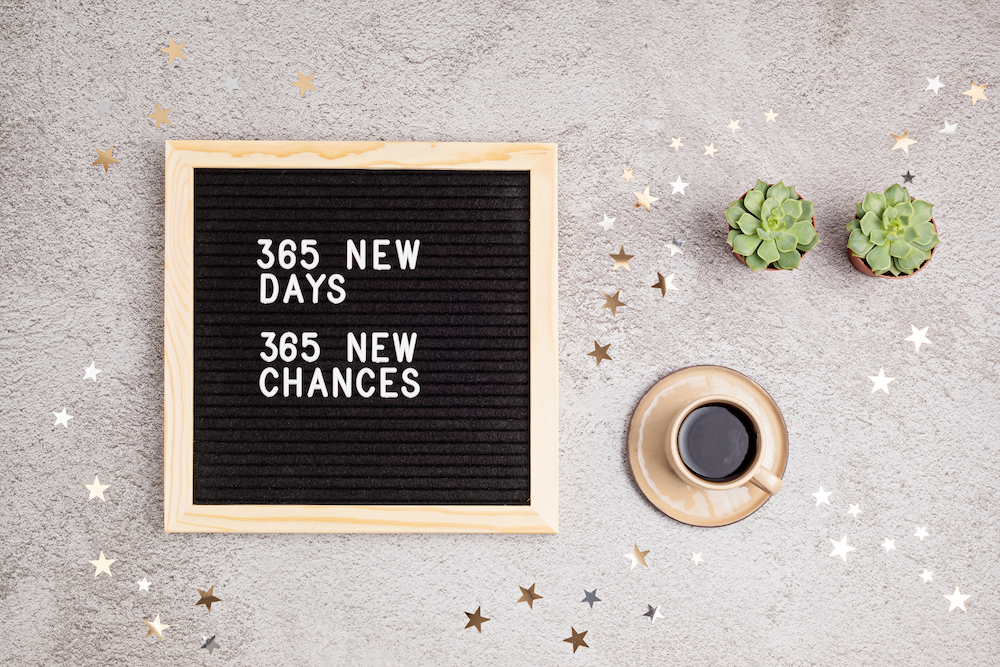
I’ve had the same new year’s resolution for as long as I can remember, lose weight, and earn more money.
On paper they both seem achievable, however as I write this, my lockdown bulge of 2020 is still evident and there’s mothballs in my purse.
Does that make me a failure because I didn’t achieve my resolutions? I like to think not. But it does make me like thousands of others who’ve also quit the plans they were so determined to reach by 1 February.
According to new research the average person has thrown in the New Year’s resolution towel after just 32 days, with a whopping 68% doing it long before then.
So, with that in mind, I’ve resolved not to make any resolutions this year, instead of motivating me they drag me down, a punishment of my own making that I never seem to accomplish. A few days into my healthy new year’s, lifestyle I’ll catch myself in a ‘snacksident’ (that’s an accidental snack) and think, “well that’s the resolution ruined, might as well forget about it…”
Does that mean we should give up on our ambitions whatever they might be for fear of failure and disappointment? That we should be happy with our lot and not strive for more? Of course not, it just means there’s got to be a better way than making a boozy promise with myself on 31 December to never eat a packet of crisps or a Chinese takeaway again.
I present to you, the idea of goal setting. How, might you ask, does that differ from a resolution? Afterall, it’s still a task or an outcome that you’ve given yourself that you want to achieve.
And that’s true, but people who set realistic goals for themselves with achievable, measurable results are far more likely to get what they want in the long-term, rather than someone who just ploughs in with no real plan of action in mind.
Setting personal goals is good for mental health and wellbeing, it can help shift focus onto the things that are important to you while distracting you from your troubles. Learning how to set goals and the best way to achieve them, can help you to live your life on your terms. When you create your own goals, you are in control, and you decide what success looks and feels like to you.
The principles of goal setting can be applied and adapted to most situations. Here are some ideas to lift your aspirations off the ground
1. Before you begin with your goal setting, be certain that it’s something that you want to do for you
2. Write down what you want to achieve in as much detail as possible. It brings flow, clarity, and creativity to your ideas. Also, people who write down their ideas are 42% more inclined to succeed
3. Carry your goal with you in the back of a purse or wallet, maybe even take a photograph and use it as the screen saver on your phone, look at it throughout the day and imagine yourself having completed your goal
4. Write down why you want to reach your goal, include how will you feel when you have, what will have changed or improved for you?
5. Set yourself a realistic date of completion, it gives something to work towards. If you give yourself too long to reach a goal, you’ll likely lose interest, if you give yourself too short of an amount of time, you might rush and not get the long-term results you’d like
6. Measure your goals, see how far you’ve come and how far you must go. Do this on a minimum of a weekly basis, and make any tweaks to the plan as required, if something isn’t working, then change it so it does
7. There may be times when the plan feels too difficult, and you feel yourself losing motivation. This is the time to dig deeper, look back on the reasons you wrote down for wanting to achieve your goal, this will remind you why you should keep going
8. Take a break. The goal might require daily time or effort, but it’s OK to take a day off and come back to things fresh and ready to go with new enthusiasm
9. Look back at how far you’ve come, and congratulate yourself for the milestones and improvements you’ve made
10. If you’ve read this far, the chances are that you already have a goal in mind, don’t be afraid to go for it, no matter what it might be. Remember, nothing can change until you do- you can do this!
Shannon Humphrey is a youth and adult, first aid for mental health instructor working within education, businesses and community groups. Visit www.pathwaysforpositivity.com for more information about her work.
Photo: Shutterstock


